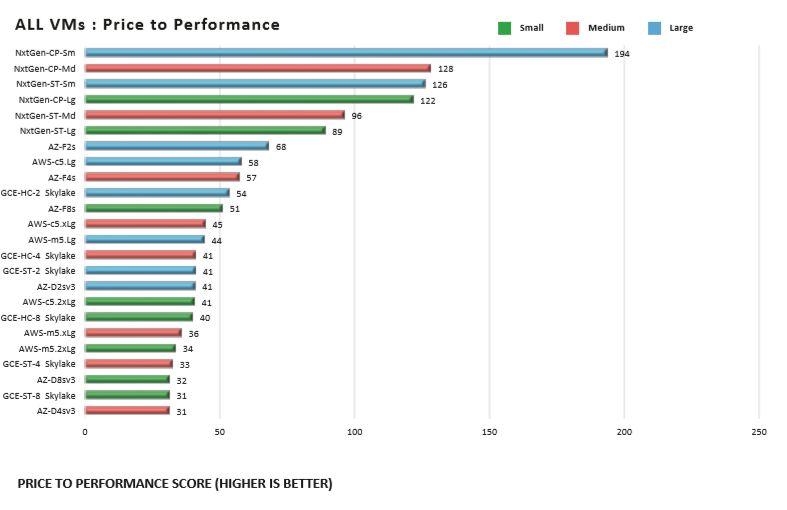NXTGEN ECS BEATS AMAZON AWS, GOOGLE & MICROSOFT AZURE IN PRICE PERFORMANCE
Cloud Spectator tested Amazon Web Services, Google Compute Engine, Microsoft Azure and NxtGen VMs head-to-head across three VM size classes and two CPU:RAM categories: compute optimized (1:2 vCPU to RAM ratio) and standard (1:4 vCPU to RAM ratio). The testing and data collection were performed by running exhaustive computational, storage and networking benchmarks on all VM configurations. From these results, the price-performance value for all VMs was determined. NxtGen provides far superior value in random read and write performance against all provider VMs tested, although NxtGen's write tests were not as decisive of an advantage.
The CPU and memory performance by all NxtGen VMs was impressive, given its use of Intel Xeon Gold 6152 CPU's. Only Azure's Fs series VMs were able to approach NxtGen's CPU performance, achieving roughly 80% in the compute-optimized class. However, NxtGen clearly stood apart in the standard VM category.
Google Compute Engine offerings were consistent in all areas. However, Google VMs were unable to achieve NxtGen's performance levels or compete with NxtGen's aggressive pricing model.
The Cloud Spectator analysis revealed that NxtGen is highly competitive with major providers. NxtGen provides an aggressive pricing strategy, yet does not sacrifice high performance in CPU-memory testing or intensive read/write storage operations. Combined with excellent network throughput performance, NxtGen is positioned as a superior provider for generalized Cloud use-cases, and is well-suited for multi-role infrastructure with its VMs able to support workloads demanding high network throughput, such as clustered servers or load balanced web servers, regardless of budget.
NXTGEN ECS BEATS AMAZON AWS, GOOGLE & MICROSOFT AZURE IN PRICE PERFORMANCE
